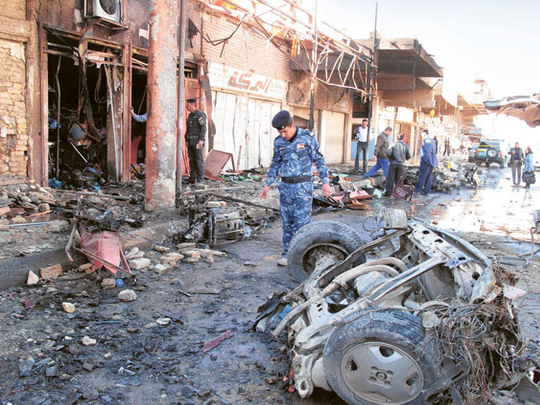
Baghdad: Bombings and shootings across Iraq killed 46 people yesterday, striking at police and Shiite pilgrims in a torrent of violence that officials had dreaded in the run-up to a Baghdad meeting of the Arab world's top leaders, which the government hoped would showcase the nation's stability.
There was no immediate claim of responsibility for the attacks, which also wounded more than 200 people. But, authorities have feared Al Qaida would try to thwart next week's annual Arab League summit.
The gathering is to be held in Iraq for the first time in a generation. Plans for Baghdad to host the meeting last year were postponed, in part because of concerns about Iraq's security.
One of the deadliest strikes yesterday hit the Shiite city of Karbala, where officials said two car bombs exploded in a crowded shopping and restaurant area. Thirteen people were killed and another 50 were wounded in that attack, local provincial council member Hussain Shadhan Al Aboudi said.
Bid to abort summit
"The intention of these attacks is to destabilise the security situation in Karbala and other Iraqi cities and to shake the people's confidence in the government," Al Aboudi said. "It seems that the terrorists want to abort the upcoming Arab Summit in Baghdad. The message is directed to the Arab leaders that Iraq is not safe enough to be visited."
Karbala, 80 kilometres (km) south of Baghdad, is a destination for thousands of Shiites from around the world who visit the golden shrines of two revered imams each day. Five Iranians were among the dead.
The wave of violence began after dawn yesterday.
Militants blew up the house of a police official in the western city of Fallujah, planted bombs near the fortified Green Zone and shot up a security checkpoint in Baghdad, set off an explosion at a police station in the northern city of Kirkuk and attacked restaurants and shopping areas in two southern towns.
In all, eight cities were hit in attacks that mostly appeared to target police and government officials.
Saman Majid, a cameraman for the Kirkuk police department, said he had just arrived at work when the bomb outside the station exploded. He said he was wounded by small shrapnel that hit his head and ran to the Kirkuk General Hospital for treatment instead of waiting for an ambulance.
"I quickly got out of my car to see burned bodies trapped inside the cars," he said. "Dozens of cars were on fire. It was a scene from hell, where there is only a huge fire and dead people and nothing else."
Policemen killed
Thirteen people, most of them policemen, were killed in Kirkuk, Brig. Gen. Sarhad Qadir said. An additional 59 were wounded. Kirkuk is 290 km north of Baghdad.
Officials have been bracing for attacks in the run-up to the Arab League summit during which the Shiite-led government hopes to showcase Iraq's improved security and stability since the sectarian fighting a few years ago that almost pulled the country into civil war.
Insurgents are seeking to belie Baghdad's better image, and officials expect more attacks as hundreds of dignitaries converge on the capital next week.
Two of the attacks yesterday hit right outside the Green Zone where the summit will be held.
Last week, the government said Iraq would deploy an unprecedented number of security forces to protect the capital for the summit. An estimated 26,000 police and soldiers — including more than 4,000 from Iraq's north and south — are expected to be deployed in Baghdad.
But, citizens and lawmakers have questioned whether Baghdad would be safe during the Arab meeting.
Iraqi government spokesman Ali Al Dabbagh yesterday announced a week-long federal holiday in Baghdad from March 25-31 when government offices will be shut down.
Curfew likely
Officials also will impose a curfew in parts of Baghdad on March 29, when the Arab heads of state fly in, and try to curb violence by shutting off roads near the Green Zone and encouraging people to stay at home.












